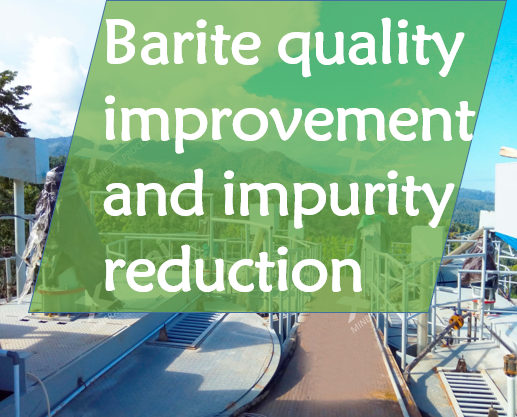Barite quality improvement and impurity reduction
2024-10-31 Xinhai (1559)
2024-10-31 Xinhai (1559)
If you have any questions, please contact us through the following ways, we will give you more and better assistance!

Barite, a barium sulfate mineral, has become particularly important due to its wide range of applications in several industrial fields. With the exploitation of resources, high-grade barite has become increasingly scarce, and the types of associated minerals have increased. The traditional manual selection method can no longer meet the needs of modern industry. Therefore, it is crucial to use advanced mineral processing technology to upgrade barite and reduce impurities.
In the early days, due to the high grade of barite, manual sorting was a feasible method. However, as resources deplete and tastes decline, manual picking is no longer suitable. The development of modern technology, such as nuclear radiation sorting machines, photoelectric sorting machines and X-ray sorting machines, has provided more efficient and accurate solutions for barite sorting.
The magnetic separation method is mainly used to process magnetic minerals and improve the grade of barite by removing iron, manganese and other elements. For example, the "magnetic separation-grinding-acid leaching" process adopted by Wangge has significantly improved the whiteness and grade of barite.
Gravity separation, also known as gravity separation, sorts minerals based on differences in their sedimentation rates. Although this method is effective in some cases, it usually needs to be combined with other mineral processing methods to achieve better separation results.

The flotation method utilizes the differences in physical and chemical properties of barite and gangue minerals to achieve mineral separation by adding collectors or inhibitors. For carbonaceous barite, there are three flotation processes: flotation after pre-carbon removal, flotation after carbon suppression, and flotation of carbon and target minerals together before separation. Among these methods, collectors such as kerosene, diesel oil, and pine alcohol oil can effectively remove carbonaceous gangue.
The calcination method is an effective method to improve the grade and whiteness of low-grade barite, and is especially suitable for the "black to white" process of carbonaceous barite. By calcining at the appropriate temperature and time, the color-causing substances can be removed to the greatest extent without destroying the mineral crystal structure.
In summary, the barite upgrading and impurity reduction process needs to comprehensively consider the properties of the ore and industrial needs, and use a combination of various mineral processing technologies to achieve maximum resource utilization and environmental protection goals. With the continuous advancement of technology, future barite mineral processing will be more efficient and environmentally friendly, providing higher quality barite raw materials for industrial production.